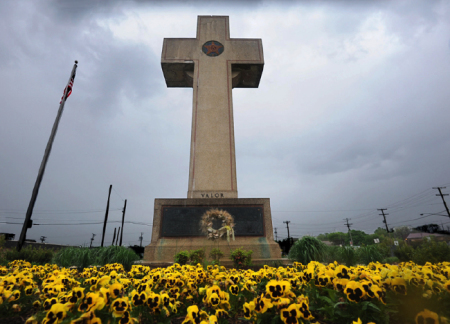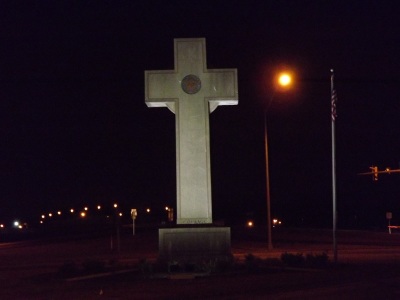Bladensburg Cross Unconstitutional, Federal Court Rules; Supreme Court Next?

A three-judge panel of a federal appeals court has ruled against a large cross that was erected back in the 1920s on public property as part of a war memorial in Maryland.
The Fourth Circuit Court of Appeals panel ruled Wednesday that a 40-foot-tall cross in Bladensburg violated the Establishment Clause, overturning a lower court decision.
"The monument here has the primary effect of endorsing religion and excessively entangles the government in religion. The Latin cross is the core symbol of Christianity," read the ruling.
"And here, it is 40 feet tall; prominently displayed in the center of one of the busiest intersections in Prince George's County, Maryland; and maintained with thousands of dollars in government funds. Therefore, we hold that the purported war memorial breaches the 'wall of separation between Church and State.'"

An atheist organization known as the American Humanist Association brought the lawsuit against the cross on behalf of two local residents.
Monica Miller, senior counsel from the AHA's Appignani Humanist Legal Center, celebrated the Fourth Circuit's decision in a statement released Wednesday.
"The court correctly ruled that the cross unconstitutionally endorses Christianity and favors Christians to the exclusion of all other religious Americans," stated Miller.
Placed at the intersection of Maryland Route 450 and U.S. Route 1, the Bladensburg Cross was an American Legion memorial project completed in 1925.
In 2012, the American Humanist Association sent a letter to the Maryland National Park and Planning Commission demanding that the cross be removed.
In Feb. 2014, the AHA filed a lawsuit against the Planning Commission on behalf of two members who lived in the area and a third person from Beltsville.
"This action challenges the constitutionality of the defendant's ownership, maintenance and prominent display on public property of a massive Christian cross (the 'Bladensburg cross') as a violation of the Establishment Clause of the First Amendment of the U.S. Constitution, as applied to Maryland by the Fourteenth Amendment," read the suit.
In late Nov. 2015, U.S. District Judge Deborah K. Chasanow ruled in favor of the cross, arguing that it did not have an exclusively religious purpose.
"Although the Latin cross is undeniably a religious symbol ... Other courts have recognized that displaying a cross to honor fallen soldiers is a legitimately secular purpose, and does not always promote a religious message," wrote Judge Chasanow.
"Even the purpose of the private citizens who were behind the Monument's construction 90 years ago was a predominantly secular one ... The Monument's groundbreaking was a predominantly secular affair that also included the groundbreaking of the National Defense Highway."
In Dec. 2015, the AHA filed an appeal with the Fourth Circuit, Senior Counsel Miller stating at the time that she and her organization "will continue defending the First Amendment rights of our clients as well as all non-Christian service members who are excluded from the government's Latin cross monument."
Hiram Sasser of the First Liberty Institute, which has been active in defending the Bladensburg Cross, stated Wednesday that he believed the Fourth Circuit decision creates a "dangerous precedent by completely ignoring history, and it threatens removal and destruction of veterans memorials across America."
Kelly Shackelford, president and CEO of First Liberty, added, "We are exploring all of our options on behalf of the American Legion, including an appeal directly to the U.S. Supreme Court."





















